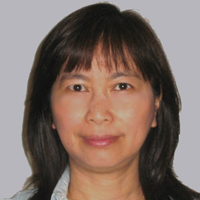
HemAware is conducting a series of interviews with researchers who have received awards from the National Hemophilia Foundation (NHF) to pursue their research interests. The first interview was conducted with Carol H. Miao, PhD, associate professor in the Department of Pediatrics at the University of Washington and Seattle Children’s Hospital. Miao’s laboratory, in the Gene Therapy and Repair Department in the Center for Immunity and Immunotherapies, has been experimenting with the use of nonviral vectors (vehicles) to deliver factor VIII (FVIII) and IX (FIX) genes into the livers of mice to correct FVIII and FIX deficiency, or hemophilia A and B. It is also researching ways to prevent or regulate the immune system’s production of inhibitors, antibodies to factor product.
What drew you to this field? What was your initial interest in this field of research?
Miao credits training in Dr. Earl Davie’s coagulation lab at the University of Washington as sparking her interest in hemophilia research. What lured her to stay were the patients. “Patients who suffer from this disease don’t have very good treatments,” she says. “That’s what drew me to this field—I would like to develop better treatments for the hemophilia patients.”
Where were you in your career when you were awarded the NHF Career Development Award?
When Miao received the award in 2002, she had just been recruited as an assistant professor in the pediatrics department at the University of Washington and a principal investigator at the Seattle Children’s Hospital.
What did you use the grant for?
The grant was used to fund Miao’s study, “Nonviral Gene Delivery and Immunomodulation for Hemophilia.” She was interested in helping patients with hemophilia overcome the two main treatment challenges—obtaining enough factor protein and dealing with inhibitors. “I got very interested in trying to figure out a better way of helping patients to eliminate or modulate their immune responses against factor FVIII.” The timing was ideal. “The grant came at a great time when I started establishing the research project—how to do this. It helped me to start in this direction.”
Did the research NHF funded through the Career Development Award assist in advancing your own position at your research institution/hospital? Or did it serve as a building block to further your career or research in hemophilia?
“I think it did both for me,” Miao says. It helped her career as she began her position as assistant professor and to follow separate research tracks. “It helped me build the foundation because I had two directions—developing gene therapy strategies for treating hemophilia and immunomodulation for hemophilia inhibitors.” It also helped pave the way for Miao to receive additional funding from other sources to extend the research. “There was a combined funding opportunity with NHLBI (National Heart, Lung, and Blood Institute) and NHF. So I applied and got an RO1 grant to continue this work.”
Are you still engaged in coagulation or bleeding disorders research specifically?
“Yes, all of my research focuses on hemophilia treatments. We’re getting very exciting, good results from some preliminary data.”
How does/will your research have an impact on the clinical aspects of patient care?
Miao says her lab is pursuing the “two most important questions in hemophilia treatment”—improved factor product and preventing inhibitors. Better treatments would significantly decrease the cost and increase the convenience and welfare for patients, she says. “If we can develop a really safe and effective gene therapy treatment, it would drastically improve the treatment.” Miao’s lab is experimenting with different approaches to inhibitors. “We’re mainly working on immunomodulation by using novel monoclonal antibody and regulatory T cell therapies to suppress immune responses.” They are also modifying immune tolerance induction techniques, a type of desensitization method similar to allergy desensitization.
What career goals do you have for the future?
“My career goal is to push the application of some of the gene therapy and immunomodulation protocols and strategies that we’re developing currently into eventual clinical applications.” Before that can happen, though, Miao says many steps will have to be taken.
Where do you see bleeding disorders research going?
“For treatment right now, I see people investing different things for proteins. We never know which one will work the best.” Miao makes the connection between her own research and others. “While we’re doing gene therapy, we’re improving the gene expression. But that also has relationship with the people who are modifying the proteins to make them have longer half lives.” Gene therapy will provide the vehicle by which recombinant proteins made by tissue culture systems are delivered into the human body, she says. “We’re doing some very exciting work on the monoclonal antibody therapy to be used as the immunomodulation therapy.” Miao is looking forward to the day when the therapies move out of the lab and into human subjects. “We would like to see it eventually come to the clinical trial phase, to see which agent, method or protocol would be best for the patients. We are going to have much better treatments, hopefully in the near future.”
When you’re not working, how do you “escape” from your work?
Miao is hard pressed to come up with answers, with free time being a luxury, not a given. She did manage to round up a few ideas, though. “I like swimming for exercise,” she says. Miao also enjoys hiking and reading some books other than research papers. Another interest is gardening. “I actually like gardening a lot, but I don’t have time to do it.” Living in the Pacific Northwest offers a major benefit to time-strapped gardeners like Miao. “In Seattle, the plants are very helpful—they grow by themselves because they have a lot of rain,” she says with a laugh.
